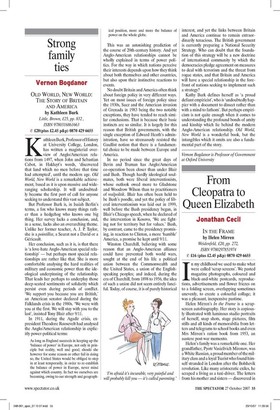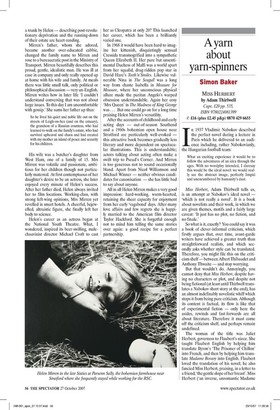From Cleopatra to Queen Elizabeth
Jonathan Cecil IN THE FRAME by Helen Mirren Weidenfeld, £20, pp. 272, ISBN 9780297851974 © £16 (plus £2.45 p&p) 0870 429 6655 1 n my childhood we used to make what were called 'scrap screens'. We pasted magazine photographs, coloured and black-and-white postcards, reproductions, advertisements and flower friezes on to a folding screen, overlapping sometimes unevenly, to create a colourful collage; it was a pleasant, inexpensive pastime.
Helen Mirren's In the Frame is a scrapscreen autobiography. Her story is copiously illustrated with luminous studio portraits of herself, snap shots, stage pictures, film stills and all kinds of memorabilia from letters and telegrams to school books and even Mrs Mirren's ration book from 1953, an austere post-war memento.
Helen's family was a remarkable one. Her grandfather, Pyotr Vasielivich Mironov, was a White Russian, a proud member of the military class and a loyal Tsarist who found himself stranded in London after the Bolshevik revolution. Like many aristocratic exiles, he scraped a living as a taxi-driver. The letters from his mother and sisters — discovered in a trunk by Helen — describing post-revolutionary deprivation and the running-down of their estate are heart-rending.
Mirren's father, whom she adored, became another over-educated cabbie, changed the family name to Mirren and rose to a bureaucratic post in the Ministry of Transport. Mirren beautifully describes this proud, gentle, idealistic man. He was ill at ease in company and only really opened up at home with his wife and family. At meals there was little small talk, only political or philosophical discussion — very un-English. Mirren writes how in later life 'I couldn't understand conversing that was not about large issues. To this day I am uncomfortable with gossip.' She sums her father up thus: So he lived his quiet and noble life out on the streets of Leigh-on-Sea (and on the estuary), the grandson of a Russian countess, who had learned to walk on the family's estate, who had survived upheaval and chaos and had created with my mother an island of peace and security for his children.
His wife was a butcher's daughter from West Ham, one of a family of 15. Mrs Mirren was volatile and passionate, ambitious for her children though not particularly maternal. At first contemptuous of her daughter's desire to be an actress, she later enjoyed every minute of Helen's success. After her father died, Helen always invited her to film locations. Working-class, with strong left-wing opinions, Mrs Mirren yet revelled in smart hotels. A cheerful, bejewelled, altruistic figure, she finally left her body to science.
Helen's career as an actress began at the National Youth Theatre. What, I wondered, inspired its beer-swilling, malechauvinist director Michael Croft to cast her as Cleopatra at only 20? This launched her career, which has been a brilliantly varied one.
In 1968 it would have been hard to imagine her kittenish, disquietingly sensual Cressida transmogrified into a sympathetic Queen Elizabeth II. Her pure but unsentimental Duchess of Malfi was a world apart from her squalid, drug-ridden pop star in David Hare's Teeth 'n'Smiles . Likewise vulnerable Nina in The Seagull was a long way from chaste Isabella in Measure for Measure, where her unconscious physical allure made the puritan Angelo's warped obsession understandable. Again her cosy 'Mrs Queen' in The Madness of King George was . .. But one could go on for a long time praising Helen Mirren's versatility.
After the accounts of childhood and early acting days — out-of-season Southend and a 1960s bohemian open house near Stratford are particularly well-evoked — this attractive book becomes gradually less literary and more dependent on spectacular illustrations. This is understandable; actors talking about acting often make a swift trip to Pseud's Corner. And Mirren is too generous not to sound occasionally bland. Apart from Nicol Williamson and Michael Winner — neither obvious candidates for canonisation — she has little bad to say about anyone.
All in all Helen Mirren makes a very good impression: hard-working, warm-hearted, retaining the sheer capacity for enjoyment from her early 'vagabond' days. After many love affairs and few regrets she is happily married to the American film director Taylor Hackford. She is forgetful enough not to mind him telling the same stories over again: a good recipe for a perfect partnership.



































































 Previous page
Previous page